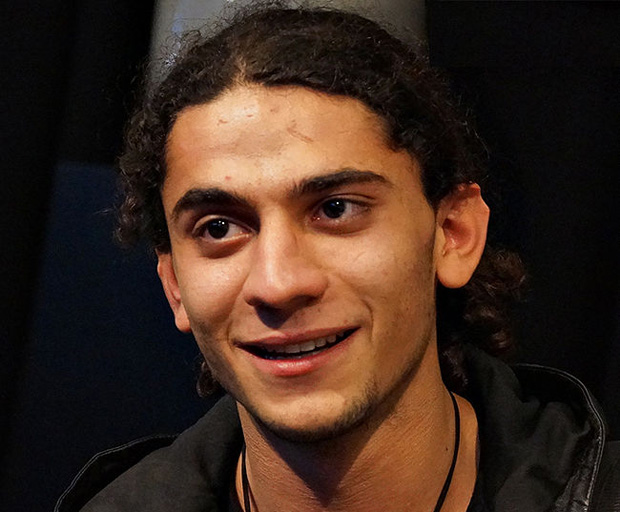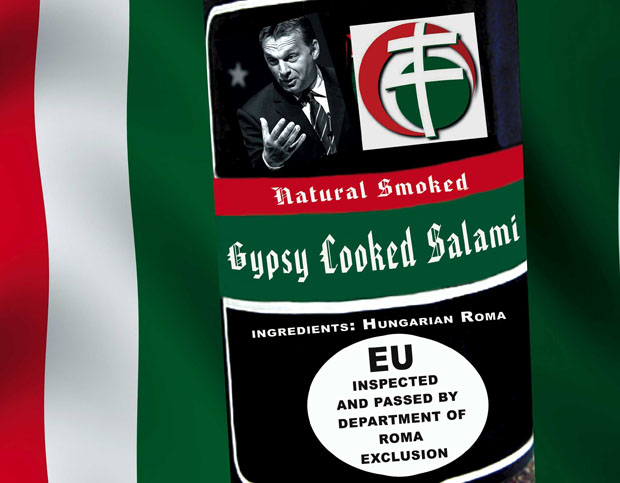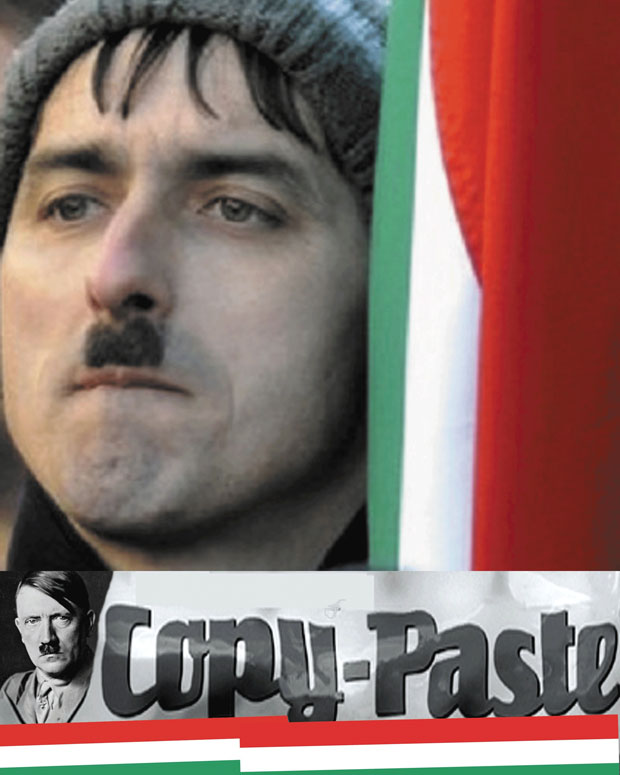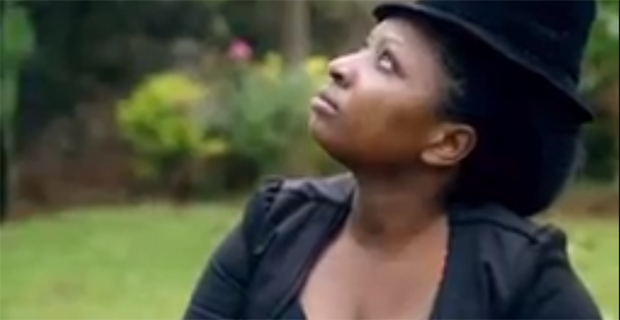27 Nov 2013 | Denmark, Europe and Central Asia, News

Yahya Hassan at the Copenhagen Book Fair “BogForum 2013” (Photo: Mogens Engelund)
Against the backdrop of nationwide debate and with tight security, Danish poet Yahya Hassan yesterday took to the stage at H.C. Andersen School in the Vollsmose area of the city of Odense, for a much anticipated reading of his controversial work.
While the reading took place without serious disruption, a 19 year-old man was arrested “to keep the peace”. A group of protesters had also gathered outside, telling newspaper Extra Bladet Hassan was “trampling on our culture”, and a car from the broadcaster TV2 also had its tyres slashed. The police said they had turned several people away from the premises in the days leading up to the event, and a group of about 10-15 young men were also stopped from attending. Hassan himself was smuggled out of premises by the police after the event.
Hassan, a Palestinian-Danish 18 year old, rose to fame following an interview in daily Politiken in October, where he criticised his parents’ generation for, in his words, letting their children down. The interview was in connection with the release of his self titled debut poetry collection, which is heavily critical of Islam and parts of the Danish immigrant community. It builds on his experienced growing up in the deprived area of Gellerup in Aarhus.
He has been praised for adding a new voice to the debate on integration in Denmark, but there have been worries that the far right will use his work to their advantage. Hassan has also received a number of threats, and on 19 November, he was attacked while waiting for a train in Copenhagen.
The build-up to yesterday’s reading has not been free from controversy. It was initially to take place in Vollsmose Library, but was cancelled as police said it would pose a security risk and a threat to public order. The police wanted to move it to Odense City Hall, but Hassan and the organiser refused. Vollsmose, like Gellerup, is a deprived area and Hassan reportedly did not believe he would reach his intended audience in the city hall.
Finally, it was decided the event should go ahead after all, and took place yesterday, as planned, but at the H.C. Andersen School. There was a heavy police presence and even a flying ban over Vollsmose from 10 am on Tuesday, to 2 am today. There were reports of a £110000 price tag on the security measures, but Justice Minister Morten Bødskov said this was not an issue of police resources, adding that is the job of the police and county administration to ensure that the “framework for free and open debate” is in place.
This article was posted on 27 Nov 2013 at indexoncensorship.org
28 Oct 2013 | Egypt, News

An image from Ghada Wali’s Film Ikhwany
A London gallery has found itself in a censorship dispute, after deciding not to exhibit 12 prints satirising Egypt’s Muslim Brotherhood and jailed former president Mohamed Morsi.
In The City, an exhibition dealing with the four Arab cities of Alexandria, Algiers, Baghdad and Nablus, is currently taking place at the P21 Gallery. Twelve posters by Egyptian artist and graphic designer Ghada Wali, making up the piece Film Ikhwany, were supposed to be part of the Alexandria portion. Using images of Mohamed Morsi on a series of film posters, it aims to deny the “‘Brotherhoodisation’ of Egypt”.
However, four days before the opening on 26 September, curator Danah Abdulla was told by the gallery that the prints were not to be exhibited after all. She was told they had taken legal counsel and that the images were deemed “too risky”. She was asked to find new pieces to go in their place.
When she challenged the decision, she was told the work was too politicised and did not fit in with the rest of the exhibition. This came after the images had been used in press releases. When she kept pushing the issue, it was suggested she alter the posters to remove text that could be perceived as controversial.
“I was told the gallery was not a political space, but they have had two extremely political exhibitions in the past,” she said, referring to their recent one dealing with the Syrian civil war. “This exhibition is not purely political, it is about the city, therefore you do touch on the politics. I’m not going to pretend the city is unicorns and ponies.”
“The work is opinion, it’s not fact. Everything is opinion, it’s not stating anything factual. It’s freedom of expression, plain and simple, so I didn’t really understand why they were so worried about the work,” she explained.
The designer Ghada Wali said she wanted to shed light on the political struggle in Egypt through her work, but never though it would be deemed too risky to exhibit in the UK, where freedom of expression is valued and protected.
“At the end of the day, I am a free artist; I sense what I want to communicate in my artworks and which angle to tackle. This is art after all, it is not science and not literature that can be proved wrong. In Egypt, where the political agony is actually happening, I still can never be deprived of displaying my pieces. Yes, my designs can be sprayed by brotherhood supporters because they disagree with me, however I can never find an official entity crossing out my work.”
She added: “As an artist, I believe that my work has to play around the edges of the issue. My core belief as a person and my mission as an artist is to tackle a real issue. However, maybe drawing around a real issue nowadays is perceived as ‘risky’?”
The images have since been displayed London’s Hardy Tree Gallery as a solo show, with the title “The Censored”.
“It’s not to embarrass the [P21] gallery. It’s to say this [censorship] is happening here in London, and it shouldn’t happen,” concluded Abdulla.
Index has made repeated attempts to contact P21, but so far have not revceived a response to our questions.
UPDATE:
P21 responded with a statement saying the works did not adequately support the exhibition narrative, and there were worries they would “negatively impact the exhibition, the P21 Gallery and the other 11 designer’s exhibiting works.” They added that there were concerns about the level of attention the curator appeared to be placing on Film Ikhwany, as well as “about the Gallery being used for an offshore political agenda with indications that the graphic designer in Egypt was influencing the exhibition via the curator.”
They also said a number of alternative options were offered to and discussed with Danah Abdulla, including postponing the show, contact the designer directly to find a solution and exhibiting other works by the designer in future shows.
Find the rest of Film Ikhwany below, courtesy of Ghada Wali:









This article was originally posted on 28 Oct 2013 at indexoncensorship.org
8 Oct 2013 | Europe and Central Asia, News

A poster from Marika Schmiedt’s exhibition Thoughts Are Free
The Hungarian Ambassador to Austria has called for the cancellation of a “racist” and “anti-Hungarian” art exhibition which opened yesterday in the Austrian city of Linz.
Thoughts Are Free, the exhibition by Roma artist Marika Schmiedt, features posters highlighting the plight of Roma people in Europe today. Several pieces draw parallels between the Nazis and Hungary’s far-right Jobbik party, whose views on the country’s Roma population have been well documented. In one poster, Hungarian Prime Minister Viktor Orbán from the Fidesz party is pictured on the label of “Natural Smoked Gypsy Cooked Salami” next to a Jobbik logo.
Ambassador Vince Szalay-Bobrovniczky labelled the exhibition: “a cheap provocation, openly racist and hostile against Hungary, and in violation of European values and the dignity of minorities, especially the Roma,” reported the Hungarian news agency MTI.
The Ambassador also took issue with it being located in Linz City Hall, stating that that the “socialist Linz city administration” will not back out of the “discrimination filled” project due to the artist’s political and ideological ties.
He contacted both Mayor Franz Dobuschs and Austrian President Heinz Fischer demanding that the exhibition be cancelled.

Image Marika Schmiedt

Image Marika Schmiedt
Linz City Hall has also been inundated with hundreds of emails from angry Hungarians, seemingly led by the Salzburg Hungarian Club, which, in May, invited Jobbik politician Tamás Sneider to speak.
This is not the first time Thoughts Are Free has caused controversy. When the posters were first exhibited at a construction site fence in Linz last November, the Austrian police removed them following complaints lodged by Hungarians.
Mayor Dobuschs however, did not budge: “Criticism and escalation is a legitimate method in a democracy,” he said in a reply to Szalay-Bobrovniczky. “We therefore stand by the artist who will receive a public forum at City Hall”.
The exhibition opening took place yesterday as planned, with police protection. Schmiedt told Index it was very well attended.
She added: “Maybe I might also dedicate a graphic to the ambassador?”
4 Oct 2013 | Africa, News, Uganda

A scene from a music video by Ugandan singer Nnabbi Omukazi.
Ugandan artists have for a long time been able to read the public mood in the country and have taken note of it in their plays and songs.
nder the military dictatorship of Idi Amin, a few brave artists expressed themselves through music and drama. Plays that were critical of the Amin regime were written and performed. Several of the authors were killed or forced into exile.
During the early years of President Yoweri Museveni’s National Resistance Movement (NRM) government, musicians, choreographers and playwrights promoted the new government through their works for bringing back stability after the overthrow of Obote and Lutwa regimes. The general public was full of praises for the new regime and artists tapped into that feeling.
However, as the early optimism waned, many artists became more critical. These artists have been censored, paid off or even deported, delivering big blows to artistic freedom of expression in Uganda in the process.
Nnabbi Omukazi composed a song in which she claimed to have had a dream where a dead politician told her that she did not die from cocaine, but that she had been poisoned.
.
It was believed to be about Cerinah Nebanda, a young, vocal and critical member of parliament who died early this year. The government quickly told the public it was from a cocaine overdose, but her family and some members of parliament were not convinced by this explanation. They decided to hire a pathologist to take body samples of the deceased to South Africa to ascertain the cause of death. The pathologist was intercepted by security en-route to the airport and detained, which compounded the family’s suspicion that the MP had been poisoned because of her critical stance on several government positions. For composing that song, Police interrogated Nnabbi, and her song was banned from the airwaves.
Another artist, Matthias Walukagga, composed the song Tuli bakoowu (We are tired) in which he indirectly hints at the president’s overstay in power. In one verse, the artist asks; “When will the old man also declare that he is tired.” This song was banned on airwaves, but people still buy the CD’s and play it.
One of the biggest Ugandan artists, Bobi Wine aka “Ghetto President” wrote a song criticizing the way small traders in Kampala were being mistreated by the city authorities. In his song Tugambire ku Jennifer (Tell Jennifer to stop harassing us) Bobi attacks Jennifer Musisi, the Executive Director of Kampala Capital City Authority, for not caring about the plight of the poor and only protecting the interests of the rich. Responding to Bobi’s song, Musisi first dismissed it as one without consequence. However, when she realised the pressure the song was creating from the poor city dwellers, she invited Bobi to ceasefire talks. He also walked away with a fat contract to promote city activities starting with the Kampala Carnival 2013, taking place on 6 October 2013.
Patronage does not stop with politicians, it extends to almost all spheres of Ugandan society. Several other performing artists have been given fat contracts from State House (the President’s residence) to work for the presidency in different areas. In fact today, one will see a bus full of artists going to State House on invitation from the President to discuss “issues of national importance.”
Richard Kaweesa and Isaac Rucibigango, both smart and intelligent performing artists composed the song “You want another Rap”, which President Museveni used to woo young voters in the 2011 elections. This song went viral on social media and it worked in the president’s favor. The two artists were handsomely paid by the presidency. Again in 2012 when Uganda was marking 50 years of independence, Kaweesa was given another deal from State House to compose the Jubilee song. This earned him a reported 600 million shillings (US Dollars 235,300).
The same trend can be seen with comedians, as several have specialised in imitating big politicians. Segujja Museveni has perfected the art of mimicking President Museveni and has on several occasions been invited to perform for him. At his first performance before the president, he laughed so hard he had to wipe away tears. It was the first time the nation saw the president have such a hearty laugh. Since then, Segujja’s career has been on a meteoric rise.
As for dramatic artists; they are still reluctant to freely express themselves because of the potential consequences. However, they keep on making references to the political, economical and social spheres of Uganda in their plays. One artist that did this was British-born theatre producer David Cecil. He was deported from Uganda in February 2013 after being accused of staging a play promoting homosexuality. This was at a time when the government of Uganda was up in arms against anyone who seemed not to have a problem with homosexuality.
Most artists have decided to play it safe by keeping away from controversial issues, mainly political, that affect society. Sarah Zawedde, a musician says that the biggest threats to artistic freedom in Uganda are from the cultural, religious and political spheres.















